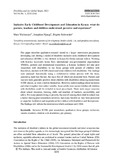| dc.contributor.author | Wickenden, Mary | |
| dc.contributor.author | Njungi, Josephine | |
| dc.contributor.author | Rohwerder, Brigitte | |
| dc.coverage.spatial | Kenya | en |
| dc.date.accessioned | 2023-08-02T13:56:03Z | |
| dc.date.available | 2023-08-02T13:56:03Z | |
| dc.date.issued | 2023-07 | |
| dc.identifier.citation | Wickenden, M.; Njungi, J. nd Rohwerder, B. (2023) 'Inclusive Early Childhood Development and Education in Kenya: What do Parents, Teachers and Children Understand, Perceive and Experience?', Disability and the Global South, Vol.10, No. 1, 2232-2262 | en |
| dc.identifier.issn | 2050-7364 | |
| dc.identifier.uri | https://opendocs.ids.ac.uk/opendocs/handle/20.500.12413/18066 | |
| dc.description.abstract | This paper describes qualitative research nested in a larger intervention programme
developing and piloting a model of disability inclusive early childhood development
and education (ECDE) in two districts in Kenya for future national rollout. Working
with Kenyan in-country teams from international non-governmental organisations
(INGOs), partners and international researchers, a Kenyan facilitator led nine peer
researchers with disabilities to run focus groups with parents of children with
disabilities, teachers in ECDE classes and some children with disabilities. The findings
were analysed thematically using a collaborative online process with the team,
generating eight key themes, the main five of which are presented here. Parents and
teachers were generally positive about children with disabilities attending mainstream
ECDE classes, as were children themselves. However, understandings about inclusion
and what it implies were rather variable. Some adults were unsure whether all children
with disabilities could be included in local pre-schools. There were major concerns
about school resources, training, skills and numbers of teachers, accessibility, and
safety. For many parents living in poverty, the cost of sending their child to school was
a factor. Having peer researchers involved, had many benefits as they were perceived
as empathic facilitators and inspirational for children with disabilities and their parents.
The findings will inform the intervention which continues until 2024. | en |
| dc.language.iso | en | en |
| dc.publisher | The Critical Institute | en |
| dc.rights.uri | http://creativecommons.org/licenses/by/3.0/ | en |
| dc.subject | Children and Youth | en |
| dc.subject | Education | en |
| dc.title | Inclusive Early Childhood Development and Education in Kenya: What do Parents, Teachers and Children Understand, Perceive and Experience? | en |
| dc.type | Article | en |
| dc.rights.holder | © The Authors. This work is licensed under a Creative Commons Attribution 3.0 License | en |
| dc.identifier.externaluri | https://dgsjournal.org/ | en |
| rioxxterms.funder | Default funder | en |
| rioxxterms.identifier.project | Default project | en |
| rioxxterms.version | VoR | en |
| rioxxterms.funder.project | 43db2a26-ab53-4dd1-873f-cff26a51d1e0 | en |


